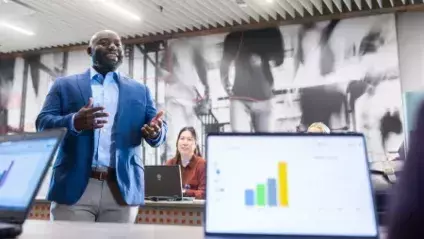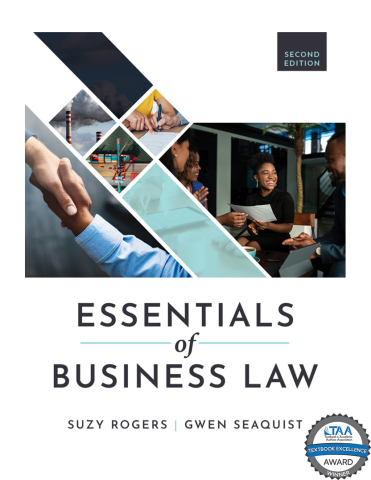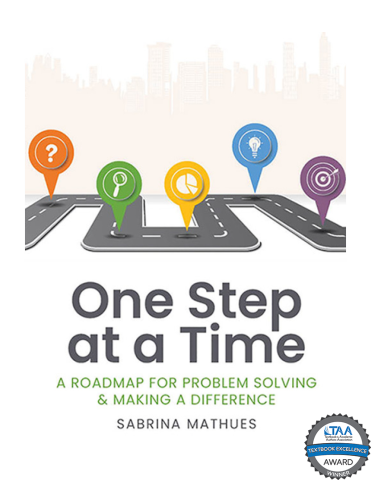Questions? Request Information
Develop Practical Accounting Skills with Real-World Experience
The success and efficiency of any business requires the dedication to detail that an accountant provides. With an online bachelor’s degree in accounting from the University of Arizona Global Campus, you’ll help determine and sustain your organization’s health and better understand the business environment through the study of ledgers, accruals, financial statements, budgets, and reporting.
Upon completion of your online accounting degree, you will be able to:
- Summarize fundamental accounting principles and procedures
- Apply technology tools related to the area of accounting
- Evaluate alternatives to complex accounting problems
- Integrate accounting and finance information in business decision making
- Appraise the legal, regulatory, and ethical issues in the practice of accounting
UAGC Award-Winning Curriculum
Military Students $250.00/credit
Undergraduate Courses $460.00/credit
Technology Fee** $115.00/course
Books and Other Class Materials** $125.00/average per course
Graduation Fee $150.00
Total Program Cost See UAGC Catalog¹
¹Keep in mind that this figure doesn’t factor in any potential discounts, partner benefits, or impact of accepted transfer credits, if eligible.

UAGC offers enrolled students access to ScholarshipUniverse, a platform that tailors external scholarship opportunities to your unique situation, making it easier to find and apply for scholarships.
UAGC is proud to provide reduced tuition rates for our academic and corporate partners, helping community college transfer students and corporate employees earn their degrees at a lower cost.


Course Overview
To earn your Bachelor of Arts in Accounting online from the University of Arizona Global Campus, you must complete 120 credits. You will need to complete 30 upper-division credits, of which 18 credits must be from the major program. A total of 30 credits must be completed at the University of Arizona Global Campus to meet the residency requirement. You may be able to transfer approved credits from community colleges, other previous college coursework, or other life experiences such as military service or job training toward your degree.
Certification and Licensure Terms and Conditions
This program is not designed to meet the state educational requirements for a specific professional license or certification in any state. Students seeking licensure or certification in a particular profession shall carefully research the requirements prior to enrollment and regularly review the requirements as they are subject to change. Requirements vary by state. The University of Arizona Global Campus does not guarantee that any professional organization will accept a graduate’s application to sit for any exam for the purpose of professional certification. Further, a criminal record may prevent an applicant from obtaining licensure, certification, or employment in their field of study.
This program is not designed to meet the educational requirements for the Certified Public Accountant (CPA) examination. Students seeking a CPA license shall carefully research the requirements provided by state boards of accountancy. A list of state boards of accountancy is available here: https://nasba.org/stateboards/
This program is not designed to meet the educational requirements for the Certified Management Accountant (CMA) certification exam. Students seeking a CMA certification shall carefully research the requirements provided by the Institute of Management Accountants (www.imanet.org).
California Students: This program alone does not lead to licensure. In order to sit for the Certified Public Account (CPA) examination, applicants must provide the California Board of Accountancy evidence of a baccalaureate or higher degree, a total of 150 semester units, including a minimum of 24 semester units of accounting subjects, 24 semester units of business related subjects, a minimum of 20 semester units of accounting study, and 10 semester units of ethics study. UAGC students who transfer in general education credits may need to determine that they are meeting the requirements during their program of study. The Ethics requirement is also not met in the undergraduate program at the University of Arizona Global Campus. Applicants must provide the California Board of Accountancy (CBA) with satisfactory evidence of having completed a minimum of 12 months of general accounting experience, a CBA-accepted ethics examination that must be passed within two years of submitting the CPA application, a criminal history background check by fingerprint via a Live Scan service and the completion of a Criminal Conviction Disclosure Form to disclose any misdemeanor or felony convictions. For additional details regarding the CA requirements for obtaining a CPA license, please visit: https://www.dca.ca.gov/cba/applicants/ed-requirements.shtml.
Certain degree programs may not be available in all states.
The Online Teaching Support Certification recognizes programs that require all online faculty to undergo training in best practices for online course delivery, provide faculty with ongoing pedagogical support, encourage faculty professional development to increase their knowledge and skill in online teaching, emphasize instructor availability and feedback to learners, and collect and use feedback from learners to improve online teaching. Learn More

The Online Learner Support Certification recognizes programs that provide all the critical student and academic services needed for learner success and use learner feedback to continuously improve those services.

What Can I Do with a Degree in Accounting?
With a bachelor’s degree in accounting, you might consider pursuing an accounting career in any of the following areas or positions:
- Accountant and Auditor
- Financial Examiner
- Credit Analyst
- Budget Analyst
- Revenue Tax Specialist
- Financial Services Officer
- Controller
By completing a degree in accounting, you are preparing yourself for a career in which a broad background and general knowledge in the field are requirements. You may choose to pursue a new job search in accounting, to start your own business, or to seek a career with local, state, or federal government.
Gain insights into the accounting job market by reviewing the Bureau of Labor Statistics market outlook report.
I decided to go back to school to further my education. I chose UAGC because of the Forbes School of Business, and it was the right fit for me.
BA in Accounting FAQs
-
While not always mandatory, a CPA certification may significantly enhance your career prospects and earning potential. It demonstrates expertise and professionalism in the field. Many employers prefer to hire CPAs, especially for higher-level positions.
Accounting degree programs at UAGC are not designed to meet the state educational requirements for a specific professional license or certification in any state. Students seeking licensure or certification in a particular profession shall carefully research the requirements prior to enrollment and regularly review the requirements as they are subject to change. Requirements vary by state.
-
A typical accounting degree program covers a variety of subjects, including financial accounting, managerial accounting, cost accounting, taxation, auditing, business law, statistics, and economics.
At UAGC, you will start off with the basics, learning debits and credits. Afterward, you will be introduced to more intermediate topics. You’ll develop analytical, technical, and other practical accounting skills necessary when pursuing a career in accounting.
-
Beyond technical knowledge, accountants need strong analytical, problem-solving, and critical thinking skills. Additionally, you’ll need attention to detail, strong communication skills, and the ability to work under pressure.
-
Accountants are needed in almost every industry. When you major in accounting, you develop strong analytical and problem-solving skills that are essential for both personal and professional life. An accounting degree program also provides a strong foundation for further study and a deep understanding of business operations.
-
Yes, you can pursue advanced degrees in accounting! Our bachelor’s degree in accounting program prepares you to enter an advanced degree program, like our online Master of Accountancy program.
See What Else UAGC Has to Offer
Questions? Request More Information
To access this rate using the Liberty Grant, only eligible undergraduate active duty service members, members of the National Guard, Reservists, spouses of active duty, members of the National Guard and Reservists, Department of Defense employees using Tuition Assistance (TA), and civilian employees of the United States Coast Guard (only if utilizing Military Tuition Assistance) will qualify.
**
The Technology Fee covers access to University systems such as the online classroom, the Student Portal, and other academic resources. The Technology Fee and the Course Digital Materials (CDM) Fee are fully refundable if a student does not attend beyond Day 3 of a course (Week 3 if covered under the University of Arizona Global Campus Promise Refund Schedule). After this time, the fee becomes non-refundable. Students are charged the Technology Fee for repeated coursework. Students are not charged the CDM fee for repeated coursework if previously charged.
†
The transferability of credits is subject to the University of Arizona Global Campus transfer credit policies and requires the submission of official transcripts. The official transcripts will be evaluated by the Registrar’s Office to determine the credits that will officially apply toward a UAGC degree program. Credits must be earned at the same degree level in order to be applied. Additional restrictions may apply. See the UAGC Academic Catalog for full undergraduate and graduate transfer policies.






